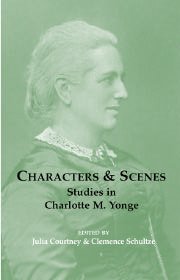
Books published by the Charlotte Mary Yonge Fellowship


|
Only four copies of the original edition survive. It has never been reprinted. Beechcroft Books
now offers an edition of the work for the first time since its original
publication. email yonge.fellowship(at)gmail.com
|
A new
book of Yonge studies email yonge.fellowship(at)gmail.com |
 |
|
|
CMYF hopes to publish further
works
by and about Miss Yonge in the future. |
|||
Le Château de Melville. or
The Young LadiesISBN 978-0-9557096-1-6
Price £5.00 (incl. UK p&p). To order, please email yonge.fellowship(at)gmail.com
Le Château de Melville was Charlotte Yonge’s first published work, written in French, as a reader for the schoolroom, when she was 15.
It was privately printed in 1839 in aid of Otterbourne Girls’ School. Only four copies of the original edition survive, and it has never been reprinted. This is a unique opportunity to obtain an edition of the work for the first time since its original publication.
Le Château de Melville relates a year in the life of the Melville sisters (“the young ladies”) who later reappeared as the Mohuns in Charlotte Yonge’s Scenes and Characters (1847), the first of her linked contemporary novels.
Interspersed with the narrative are short stories by other authors, which the young Charlotte had translated as schoolroom exercises. The original French text is given in full, together with an introduction by Hilary Clare, notes, a translation and the complete English versions of the stories by Lucy Lyttelton Cameron, Catherine Talbot and Elizabeth Whately. The stories include “The Faithful Little Girl”, “The Story without an End” and “Corylla”.
Extract from a letter from Charlotte Mary Yonge to Anne Yonge, March 1836: “One of the things I have to do for M. de Normanville is to write a story in French, and my story goes on for ever and ever . . . my poor little girls meet with all sorts of dangers.”
Extract from a letter from Charlotte Mary Yonge to Anne Yonge, late 1838 / early 1839: “I think you will be surprised to hear of your old friends the Young Ladies being in print. The truth is, that we were somewhat in despair about the Girls' School. ... we thought would do very well to publish for the benefit of the School, so the Young Ladies really made a very pretty story, with the nonsense being taken away as much as we could. The papa is a Colonel at first and then Jules goes into the army, and the story ends with Aunt Selina, Henrietta, Rosalie and Pauline setting off to join them at Paris, just after Waterloo.
“I am sure I should be glad to be able to do the slightest thing for the School, and if you find anything very nonsensical, you must remember it was written by your shatter-brained cousin of fifteen. It is to be called Le Château de Melville, ou Recreations [sic] du Cabinet d’Étude.”
Characters & Scenes: Studies in Charlotte M. Yonge
edited by Julia Courtney & Clemence Schultze
ISBN 978-0-9557096-0-9
Price £5.00 (incl. UK p&p). To order, please email yonge.fellowship(at)gmail.com
Charlotte M. Yonge was a leading Victorian novelist and a best-seller in her own time. Her books now attract considerable academic interest and still continue to appeal to the general reader. This collection of essays by Yonge specialists and scholars is published by the Charlotte M. Yonge Fellowship.
The book concludes with a sermon preached shortly after her death at St Matthew's, Otterbourne by Canon Robert Moberly, and an extensive bibliography of works by and about Yonge. This collection of studies in Charlotte M. Yonge will therefore not only be welcomed by those who are already admirers of her books but will also introduce the life and work of this extraordinary Victorian writer to a much wider readership.
REVIEWER COMMENTS ON THIS BOOK
“A collection of essays which will interest newcomers to Yonge and confirmed devotees alike. Their emphasis on Yonge’s changing responses to a variety of religious, social and educational issues, over half a century of her writing life, challenges the conventional sepia tones of older accounts. ”
PROFESSOR ELISABETH JAY
OXFORD BROOKES UNIVERSITY
“Charlotte Yonge has been overlooked and belittled for far too long — perhaps this collection will be the beginning of a renaissance in Yonge studies.”DR CHARLOTTE MITCHELL
UNIVERSITY COLLEGE LONDON
“An engaging review of Charlotte Yonge’s fiction by a body of real experts on her ‘domestic Robinson Crusoes’ — stories of moral and material survival in her legendary enormous families. The essays employ both innovative and traditional critical approaches to explore many aspects of her work, including what she read and what critics said about her, her interest in women’s work, and her consciousness of the body and its discomforts. New research on her ‘Goslings’ demonstrates the extent of her influence on the next generation of women writers. This is a fresh and readable reappraisal of Charlotte Yonge’s importance as a popular and serious Victorian novelist.”PROFESSOR VALERIE SANDERS
UNIVERSITY OF HULL
“This collection of essays draws attention to the depth and insight offered by Yonge’s quite extraordinarily prolific writing career. Still a relatively neglected author, her work testifies to the significance of the domestic, indeed ‘feminine’ dimension of faith in the Victorian period. An impressive range of perspectives is offered by the different contributors, who explore everything from Yonge’s rather fugitive children’s pieces to her more mainstream novels.”PROFESSOR DENNIS WALDER
OPEN UNIVERSITY